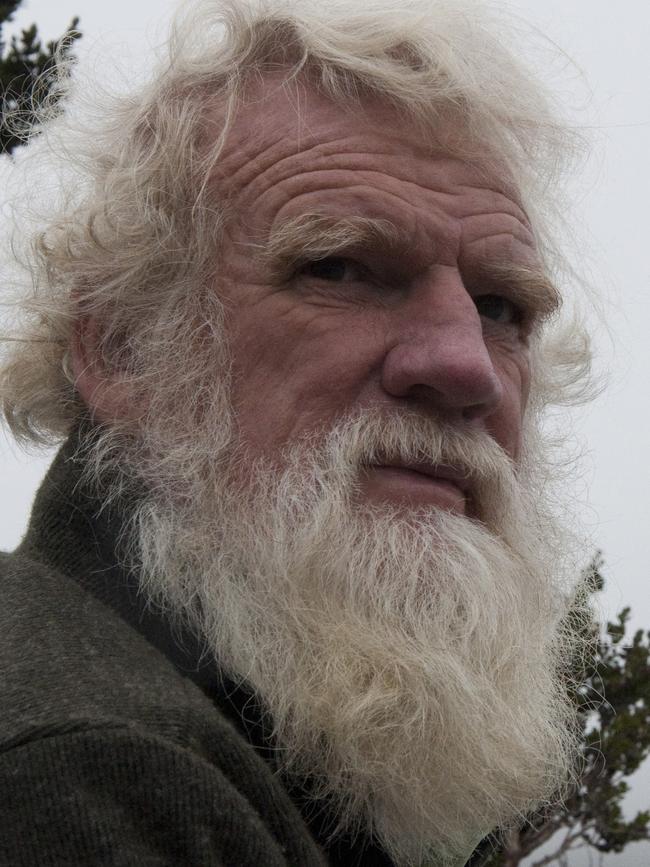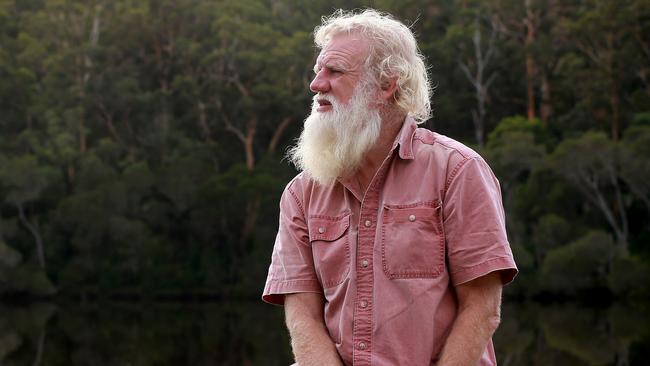Andrew Bolt: Shadows of doubt over Bruce Pascoe’s history
By the time he turned 40, “historian” Bruce Pascoe had decided to call himself Aboriginal but over the years his history has changed. If he can’t tell his own story right, why trust his history of Aborigines, asks Andrew Bolt.
Andrew Bolt
Don't miss out on the headlines from Andrew Bolt. Followed categories will be added to My News.
It’s important for best-selling “historian” Bruce Pascoe to call himself Aboriginal. It’s helped him to get away with wild untruths.
What inspired him? Was it the Canberra Times review in 1988 of his novel Fox, about a fugitive searching for his Aboriginality?
The critic said Fox would have been better if Pascoe wasn’t white.
“Pascoe is, after all, imagining the psyche of an Aboriginal person; and it is not possible for him to convey all that the concept of ‘my people’ would mean to, say, Colin Johnson …
“He writes as a humane, informed liberal, but as a white man as well.”

How that must have annoyed Pascoe, especially when Johnson, hailed as the author of the first Aboriginal novel, Wild Cat Falling, turned out not to be Aboriginal at all.
It was around then that Pascoe identified as Aboriginal himself. A profile in The Australian this year said: “By the time he was 40, he had fully identified as Koori.” Which suggests 1987.
Pascoe claims he’d had his suspicions before then but it was a family secret.
No longer. Pascoe shouted it out: “I am in fact Aboriginal,” he told the Sydney Morning Herald.
Several times he said he was Aboriginal through his mother’s grandmother, adding: “It does my soul good to go back and talk [Aboriginal] words that my great-grandmother would have spoken.”
Critics now lapped up his work, no matter how weird it became.
They even overlooked the fact that his big hit – Dark Emu – included incredible misquotations of its sources.
How else could Pascoe have argued that the historians had been wrong. Aborigines had not been hunter-gatherers but sophisticated farmers, living in “towns” of up to 1000 people, in “houses” with “pens” for animals. (Koalas, perhaps?)
How critics loved it. Pascoe’s book was short-listed for the Victorian Premier’s Award for Indigenous Writing and won Book of the Year and the Indigenous Writers Prize at the NSW Premier’s Literary Awards.
It was when the ABC this month said it would screen a two-part series promoting Pascoe and his bogus theory that I wrote two articles exposing him. Researchers on the dark-emu-exposed.org site debunked scores of his claims.
Yet ABC presenters still defend Pascoe, with two – Patricia Karvelas and Virginia Trioli – implying I was racist to criticise him. See how critic-proof it is to be Aboriginal?
But how Aboriginal is Pascoe really?
A decade ago I said Pascoe had “chosen” to be Aboriginal.
Pascoe responded in a 2012 essay which, curiously, conceded he’d been wrong about the ancestor – his great-grandmother? – that he’d thought was Aboriginal: “My cousin had discovered the woman we thought was our Aboriginal ancestor was, in fact, born in England.”
But lucky Bruce! Lightning struck his family tree twice more at least: “Both my mother’s and father’s families had an Aboriginal connection”

What that precise “connection” is, Pascoe hasn’t publicly explained and refuses to tell me.
But his publisher says Pascoe belongs to no fewer than three Aboriginal groups: “Pascoe is a writer of Tasmanian, Bunurong and Yuin descent.”
This surprises Josephine Cashman, an inaugural member of the Prime Minister’s Indigenous Advisory Council, who tweeted: “Pascoe is not Aboriginal. My son is Yuin and his father doesn’t know who is.”
Genealogist Jan Holland is also surprised. She went through births, deaths and marriage records, and more, and found that every one of Pascoe’s ancestors on both sides of his family was of British descent.
Take his mother’s “Aboriginal” grandmother. She was either a Mrs Smith, who never left England, or Elizabeth Jane Hall. I have Hall’s records before me: her dad was from Tynemouth, England, and mum from Durham.
Of course, there could be a mistake, but Pascoe won’t tell me what it is.
The point is not just that Pascoe probably doesn’t deserve protection as an “Aboriginal writer”. If he can’t tell his own history right, why trust his history of Aborigines?
The answer is: you can’t. Just see how he misquotes his sources.
As I’ve shown elsewhere, Charles Sturt, for instance, writes of meeting “3 or 400” Aborigines near Cooper Creek; Pascoe changes this to Sturt meeting “nearly 1000”.
Sturt says these Aborigines lived in an “encampment” of “huts”, mostly “constructed of boughs”; Pascoe changes this to a “town” – a “model community” – with “timber and thatch houses” with “animal holding pens” that Pascoe invented.
There are scores of such misquotations, inventions and exaggerations in Pascoe’s books and lectures.
But as long as he’s an “Aboriginal historian”, who’d be “racist” enough to object?
